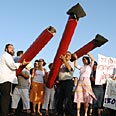
Sderot residents protest over Qassam attacks
צילום: אמיר כהן
Declaration of war
Qassam attack on Ashkelon is part of overall Hamas battleplan. Israel must drop the gloves and respond in kind
The time has come to drop the gloves. The time has come to admit that Hamas has declared war on us. The State of Israel must begin to defend itself effectively.
Until now our political echelon's battle plan has consisted mainly of rambling. Every two hours-or-so some or another senior Israeli figure is threatening someone: Syria, Hamas, Mahmoud Abbas, half the world. But they are empty threats. They don't scare anybody because the other side has already made its decision: We are at war.
Hamas has been preparing for this war for many months, on all levels. All the developments of recent months – the rain of Qassams on the western Negev, the attack on Kerm Shalom and the kidnapping of Cpl. Gilad Shalit, and now the Qassam fired at downtown Ashkelon – are not coincidental. They are part of the battle. The enemy has set out, but we still aren't sure.
Dropping the gloves
The political echelon today is dispatching the IDF to accomplish the "possible," rather than the "necessary." Flattening the land around Beit Hanoun, for instance, is a ridiculous operation. The army's static presence in Dahniya is a bad joke at the expense of the army. Blowing up empty buildings from the air is the height of answerless-ness.
Dropping the gloves means to make a decision – today – to remove the limits placed on targeted killings. Since a series of air force misses caused civilian deaths the Israeli leadership has gotten cold feet. Instead of identifying the mistakes, learning the lessons and returning to full operation, our leaders decided to neutralize the main weapon the IDF has at its disposal in the war against the Qassams.
The air force now finds itself trying to conduct targeted assassinations as if it were playing in an orchestra. With so many limitations, the air force can "sort of" carry out targeted assassinations.
Advanced technology
The Qassam that hit Ashkelon Tuesday night was a relatively new model, produced and fired by Hamas. It has a range of 7.5 miles (this is a good place for a reminder that the original Qassams had a range of less than a mile), and a similar rocket was fired at a cemetery in Ashkelon just days ago.
It is no coincidence that the rockets have once again been pulled out of the warehouses and fired at Ashkelon. They are part of Monday's ultimatum and the overall strategy of pressure surrounding the kidnapped soldier.
In other words: We have closed the door for with regards to the solder. Now we are firing at Ashkelon. When we kidnap your soldiers you feel you've got plenty of time. When we fire at Sderot you don't respond. Let's see what you do now… more threats?
Hamas is in a tough spot with regard to the kidnapped soldier. They will continue with more strategic attacks like suicide bombings, kidnappings and the like, and they will increase Qassam attacks, placing yet another Israeli city in range.
Israel today faces three central security dilemmas in Gaza:
1. Qassam attacks from northern Gaza
2. The kidnapping of Cpl. Gilad Shalit
3. Strategic parity; that is to say, Hamas' desire to create a balance of terror, like in Lebanon.
These three dilemmas are interwoven, and the military solutions to each one are different, but not necessarily contradictory. Dealing with Qassams, for instance, need not disrupt attempts to rescue Gilad Shalit.
The immediate action to deal with Qassam Rocket attacks is to take control of the areas from which the rockets are being fired. The air force knows how to deal with them, but cannot do it alone. The physical presence of IDF ground forces are the essential element in this story. This should have been done long ago.
At this stage there is no need, and it would be unwise, to re-enter Gazan cities for a prolonged stay. This could well produce a bloody battle. This is exactly what Hamas wants.
But the army must churn up the landscape, must instigate a non-stop campaign of assassinations against the Qassam brigade chain of command. AT the same time, we must understand that Qassams are likely to continue to fall. We must also understand that civilians are likely to die. That's what war is like.
Destroying parity
In the long run, we will not be able to ignore Hamas' attempts to establish parity in comparison to Israel's power of deterrence. If we don't deal with it today, we will be forced to deal with it tomorrow. We are already talking about a much larger military action than the army had previously anticipated, including entry into problem areas for extended periods of time.
The eventual goal of this activity is to destroy Hamas' military ability. The things we have ignored since pullout from Gaza must be restored immediately, and with interest.
Most importantly: We must stop burying our collective head in the sand. The Qassam on Ashkelon is another indication of what lies ahead. We are at war with Hamas.










